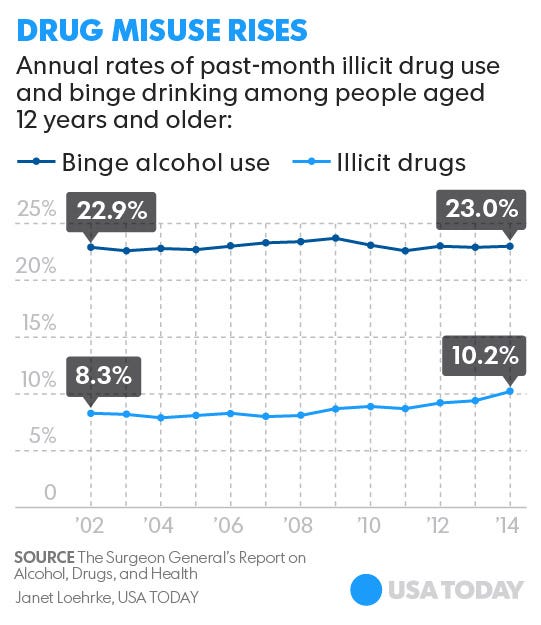Surgeon general: 1 in 7 in USA will face substance addiction

A federal report released Thursday calls for a shift in the way America addresses substance addictions, finding one in seven Americans will face such disorders. Only 10% of those addicted receive treatment, the study said.
"Facing Addiction in America: The Surgeon General’s Report on Alcohol, Drugs and Health" marks the first report from a U.S. surgeon general dedicated to substance addiction, raising the profile of the widespread epidemic and advocating proven treatment options.
An American dies every 19 minutes from opioid or heroin overdose, and Thursday’s report spells out the cost of substance abuse. The economic impact of drug and alcohol misuse and addiction amounts to $442 billion each year — topping diabetes at $245 billion, said Vivek Murthy, the surgeon general.
“At a time when we are resource-constrained already, we cannot afford, for humanitarian reasons or financial reasons, to not address addiction in America,” Murthy said in an interview with USA TODAY.
Every $1 invested in viable treatment options for substance use disorders saves $4 in health care costs and $7 in criminal justice costs, Murthy said. That’s one reason why the report advocates for a paradigm shift on addiction that removes the stigma from addiction, creating more patients and fewer prisoners.
Prep for the polls: See who is running for president and compare where they stand on key issues in our Voter Guide
“We have to recognize (addiction) isn't evidence of a character flaw or a moral failing,” Murthy said. “It’s a chronic disease of the brain that deserves the same compassion that any other chronic illness does, like diabetes or heart disease.”
Bryon Adinoff, an addiction psychiatrist at the University of Texas Southwestern Medical Center, said the report's influence carries hope that how Americans see and understand addiction might change.
Genetics account for about half of a person's likelihood of becoming addicted, Adinoff said, but viewing addiction first and foremost as an illness clashes with Americans' up-by-your-bootstraps mentality.
"Our whole approach to substance abuse disorders is they're illegal and you go to jail," he said. "It’s the only illness for which you send people to jail, for long long periods of time."
Nearly 21 million Americans struggle with substance addictions, according to the report. That’s more than the number of people who have all cancers combined.
That only one in 10 people with substance addictions receive treatment points to the significant holes in America’s health care system. High costs, a lack of screening for addictions and a fragmentation of health care services worsens the problem, according to the report.

One bright spot for those seeking treatment has been the Affordable Care Act, or Obamacare, Murthy said, which opened up 20 million to receive health insurance. The law, along with the Mental Health Parity and Addiction Equity Act of 2008, increased access to addiction treatment services.
In the wake of last week’s election, the Affordable Care Act could be overhauled. Whatever happens over the next four to eight years, Murthy said, continuing to expand coverage will remain key to addressing addiction.
Linda Rosenberg, president of the National Council for Behavioral Health, agreed. Those in the throes of addiction are often young and uninsured, she said. She praised the report as a call to action, not only for organizations such as hers that work with treatment centers but also for the incoming presidential administration.
“That includes fighting to keep the Medicaid expansion," Rosenberg said. “I don’t care whether you rename it 'Trumpcare,' I just want people to be able to get services."
“Solving this problem is not going to take place if we just pass a few laws or if public health experts just start a few more programs," Murthy said. "It’s actually going to take all of us coming together to do our part.”
That means parents talking to kids about addiction — early, he said. People who start drinking before age 15 are four times more likely to become addicted later in life than those who start at 20 or later, according to the report. It means schools implementing prevention programs and doctors receiving training on how to screen, diagnose and treat substance use disorders.
Policymakers must put resources into prevention and treatment programs, too, Murthy said.
The report stresses that successful treatment of addiction requires more than a stint with a treatment program. Professional counseling and supportive relationships both play key parts.
“I’ve just understood that addiction really touches everyone’s life,” the surgeon general said. “It’s a disease that doesn’t discriminate, and it’s one that’s taking an extraordinary toll on our communities across the country.”
Follow Josh Hafner on Twitter:@joshhafner
